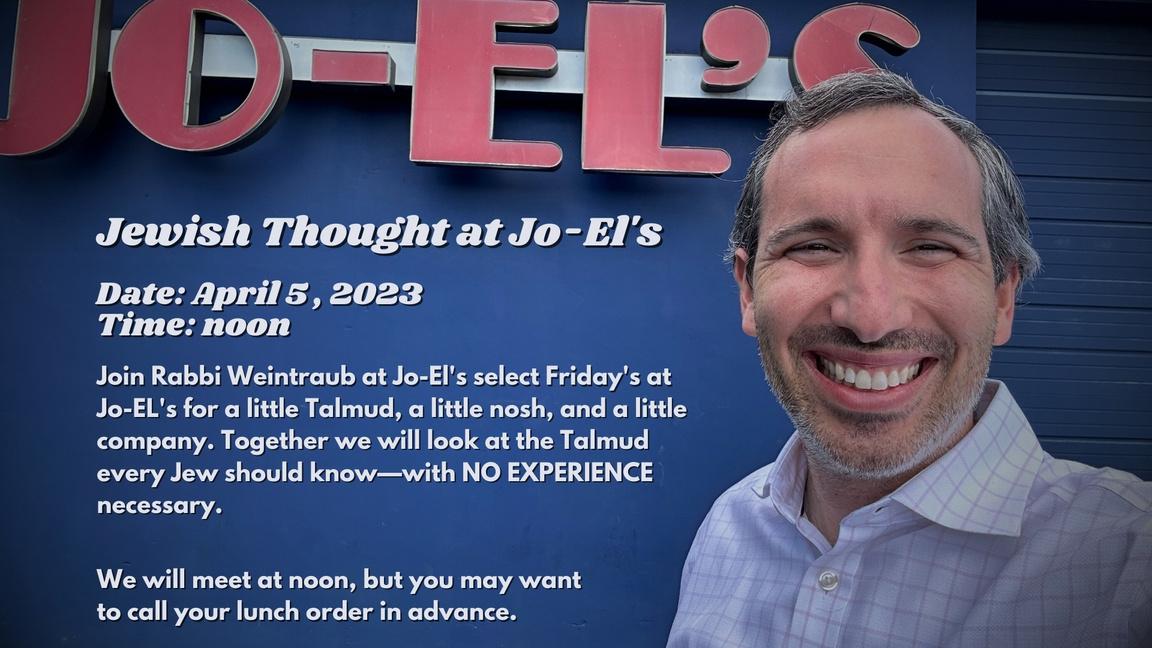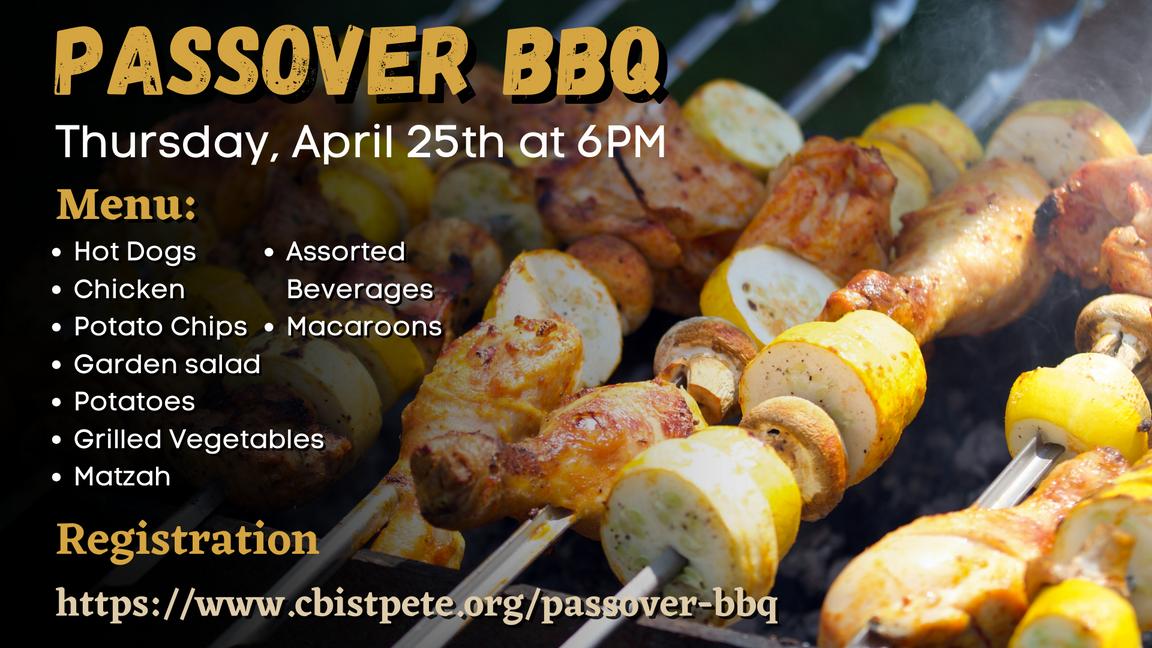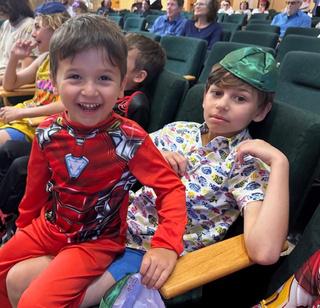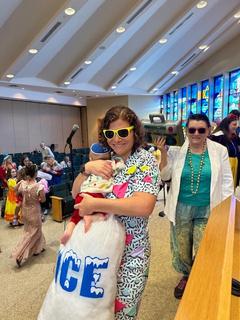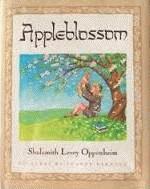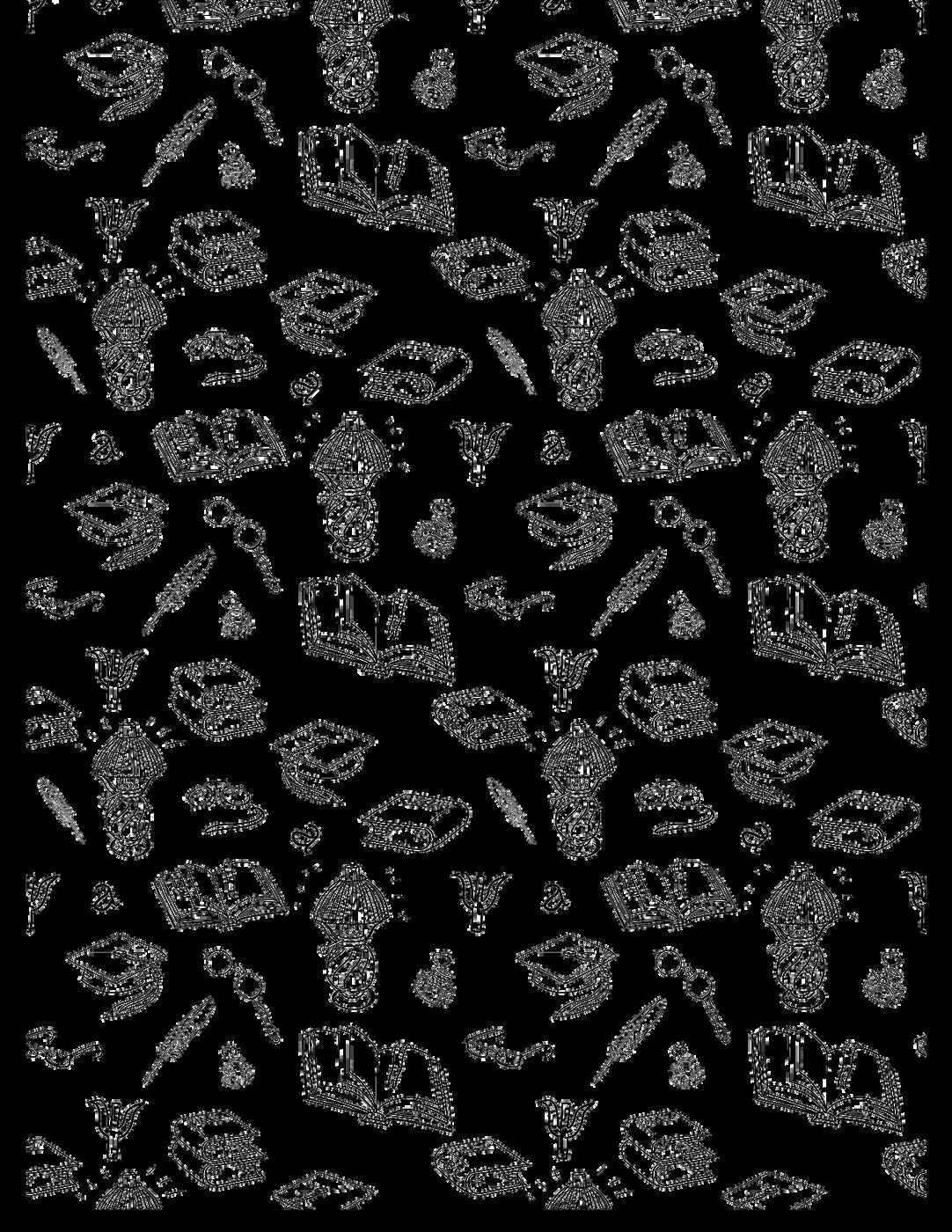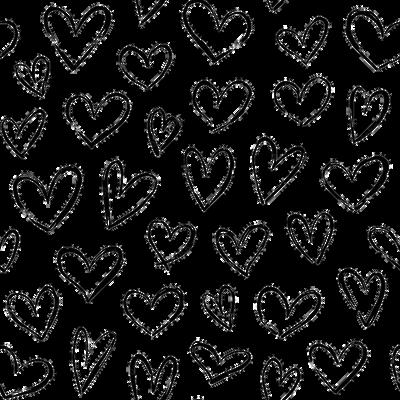


Index
April Calendar
May Calendar
Messages:
Rabbi Weintraub
Cantor Schultz
Director of Lifelong Learning, Maureen Sechan
A Message From CBI’s Israel A-Team / CBI Tot Spot
Juice, Jaws, and Jews / Hadassah Book Club
Jewish thought at Jo-Els / Rosh Chodesh
CBI’s Second Night Passover Seder
Passover Schedule
Passover BBQ
Bay Area Cantorial Association (BACA) 20th
Annual Concert
Guess Who’s Coming To Shabbas
Purim Fun
Parent Education Class / Israeli Innovations
Coffee Talk With Rabbi / Young Professionals Class
Jewish American Heroes / Lunch and Learn
Jews & Brews / Israeli Dancing
Laurie Reiskind - A True Full Life Care Champion
CBI Library
CBI Birthdays CBI Anniversaries
Israeli Dancing
April
Israeli Dancing
Lunch with the Rabbi
Coffee talk with Rabbi
Hebrew for Holidays: Passover
Torah at 10
Jewish Thought At Jo-Els
Men's Club Shabbat Dinner
Kabbalat Shabbat Service
Hebrew for Holidays: Passover
Hebrew for Holidays: Passover Battling Terrorism & Antisemitism
Coffee talk with Rabbi Hadassah / CBI Book Club
Young Professionals class
Torah at 10
Kabbalat Shabbat Service
Men's Club & Simcha Shabbat
Morning Service
Family Shabbat and Youth Service
Jews & Brews Adult B'nai Mitzvah Class
Israeli Innovations
Erev Pesach Pesach Yom Tov Service CBI Second Night Seder Pesach Yom Tov Service
PRTT Pesach Yizkor
Yom Tov Service
Men's Club Passover BBQ
Pesach Yom Tov Services
Pesach Yom Tov Services
Chol Hamoed Pesach
Torah at 10
Shabbat Morning Service
Shabbat Morning Service
Junior Congregation and Tot Shabbat
Kabbalat Shabbat Service
Chol Hamoed Pesach
Torah at 10
Kabbalat Shabbat Service
Chol Hamoed Pesach
Shabbat Morning Service

We are excited to welcome you to our annual CBI Community Second Night Seder. All are welcome from birth to 120.
REGISTER HERE
Passover 2024/5784 will be a meaningful time for all of us. We look forward to seeing you at our annual second night Passover Seder.
The central narrative of the Haggadah and of Passover is twofold: our journey from slavery to freedom and our journey from idolatry to serving HaKadosh Baruch Hu, the Holy One.
While I truly love the song Dayenu, it would not have been enough for us to stop at any point of our journey. We needed not only to escape Egypt, but to receive the Torah and to live as Jews.
Transforming our kitchens, adapting our diets, and celebrating Passover lifts our spirits. Passover prep should not be slavery, yet when we sit down for the Seder we should feel truly free!
Join me on April 18 at 7PMfor a Jews and Brews: Passover Edition and April 9th at noon for Lunch and Learn with the Rabbi: Passover Edition. We will discuss the spiritual, physical and logistical aspects of Pesach. All are welcome in person. Additionally, my “ sermon ” on Shabbat HaGadol, April 20th, will be an opportunity for you to ask any questions about Pesach that you wish.
Since we are forbidden to OWN chametz, you may appoint me as your agent to sell your chametz using our online Sale of Chametz Form. I must receive your completed form by Monday April 22nd at 8:30AM. (Assuming the buyer does not want your chametz back, you may unlock the chametz cabinet at 9 pm on Tuesday April 30th, following your Havdalah at 8:47 pm.)
Monday April 22nd\ is the Fast of the Firstborn. We will be having a Shacharit service at 8:00 am in person and on zoom, followed by an in-person seudat mitzvah breaking the fast following services, generously sponsored by Joan Redisch. Following that, you will want to stop eating chametz by 11:00 am and burn or destroy it by 12:15 pm. Since burning in an apartment is dangerous, throwing it in the trash is also an acceptable way of destroying chametz. If you want to be extra sure, you can sprinkle a little kitchen cleaner on top to ensure it is totally inedible.
As we gather again this year, let us find inspiration from one another and our beautiful traditions. Let this be a year of blessing and health for us all.
With love, Rabbi Philip Weintraub

The following was taken from an article written by
Rabbi David Golinkin.There is no question that the Seder, which is celebrated on the first night of Pesah in Israel, or on the first two nights in the Diaspora, is the central ritual of the holiday of Passover. But what is the origin of the Seder and the Haggadah?
The Torah instructs us to slaughter the Korban Pesah, the Paschal lamb, to eat it with matzot and maror, and to sprinkle some blood on the lintel and the two doorposts. It also
instructs the father to teach his son about the Exodus on Pesah. These mitzvoth, however, are a far cry from the many rituals which we do at the Seder and from the literary forms which we recite in the Haggadah.
The Seder and the Haggadah are first mentioned in the Mishnah and Tosefta (Pesahim Chapter 10) which scholars date to either shortly before or shortly after the Destruction of the Second Temple in 70 C.E. Twentieth-century scholars drew attention to the fact that the forms of the Seder are based on Greco-Roman table manners and dietary habits. For example:
Ancient Greeks and Romans would dine in a reclining position, lying on their left side on couches, and feeding themselves with their right hand. Similarly, we recline to the left when we drink wine and eat food at the Seder.
At ancient Greek and Roman banquets, a servant would dip certain foods in salt water and serve the guests. Similarly, we dip the karpas in salt water and the maror in haroset.
According to the Mishna, a person must drink four cups of wine at the Seder. The Greeks too drank many cups of wine at the symposium. Antiphanes (4th century B.C.E) said that one should honor the gods to the extent of three cups of wine.
Hillel’s sandwich: According to the Talmud and to the Haggadah itself, Hillel used to eat a “sandwich” of the paschal lamb, matzah and maror. Similarly, the Greeks and Romans used to eat sandwich bread with lettuce.
Happy Passover! Cantor Jonathan Schultz

WhatdoesLiyotAmHofshib’Artzeinu“toliveasfreepeople inourland”mean?
Part1:Pesah
Ihaveaconfession:atbusytimes—likethespacebetween PurimandPesach,followedcloselybyYomHaShoah,Yom HaZikaron,andYomHa’Atzma’ut Isometimesrevisitold articlesforinspiration.Whathaschanged,andwhenIreflect onchanges,aretherenewquestionstoconfront?
Where does our story of becoming a free people in our own land begin? Does the story begin with the covenant between God, Abraham and the land? Or, with a nod to our upcoming holiday, does it begin with the Exodus, when God redeemed us after years of oppression and we first set off as a people to the Promised Land? Now that a transformative journey! The Haggadah says we are to relive the oppression of slavery and the exodus. It says that we, too, were slaves to Pharaoh in Egypt. Here’s where I find a major change. Sadly, I find internalizing that oppression much easier this year. I’m stuck with the calendar date of October 7 lurking, never very far from my conscious thoughts. The plight of all the hostages in Gaza and the Jewish need to free these captives has intensified Pesah for me this year. Will there be wave after wave of plagues to convince our enemy to let our people go?
Once we were slaves and God freed us with Moses leading the way for us. We learned to find our way, created a new society through physical, emotional and spiritual struggle, peer conflict and resolution. We accepted the revelation at Mt. Sinai. It wasn’t neat, it was very messy. We were ready to not be slaves but we had to learn to be free in the transitional space of wandering. God initiated the Exodus of the Jewish people, and human behavior threw in a few obstacles along the way to becoming a free people in our land.
Internalizing the current story again, how will God help or help us free the hostages so that we can all feel free? We already know the current reality is really messy and very tragic. But it’s not over, and just as Queen Esther revealed her identity at the right moment, I believe the proverbial sea will part. If we really internalize the story and the experience, no one can rewrite our national narrative. We can never let that happen!
And when they are freed, what will our collective journey to peoplehood look like? It seems that journey is not ever. We are a resilient people, and the journey of becoming a free people in our own land will never end. Stay tuned for Part 2!




